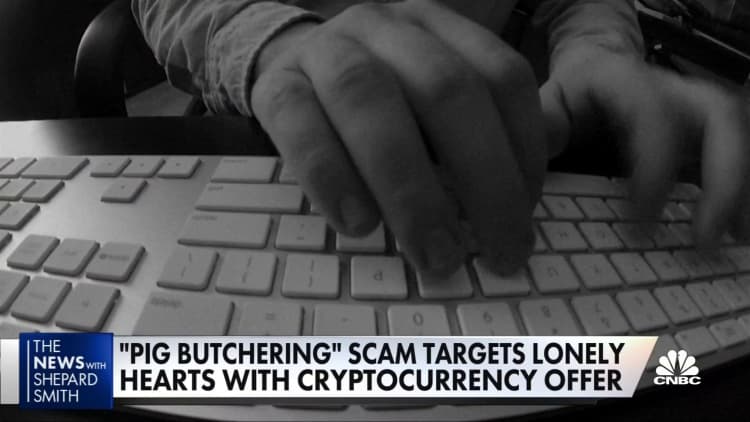An old crypto scheme has a new name — and it's costing investors millions.
So-called "pig butchering" is when a scammer builds up trust with their victims before eventually pressuring them to deposit more and more of their crypto assets into bogus digital wallets or websites controlled by the scammer.
The name refers to how scammers "feed their victims with promises of romance and riches before cutting them off and taking all their money," according to an FBI report.
And you may have already encountered the latest iteration of this scheme.
"'Pig butchering' scammers usually send a message via Whatsapp, text or another app like Tinder, as if it was intended for someone else, often with an attractive person's profile photo," says Chen Arad, chief operating officer of Solidus Labs, a company that provides tools to help crypto exchanges and institutions prevent market manipulation.

Instead of asking for a large sum of money up front, the scammers slowly work to convince their targets to move their cryptocurrency away from legitimate exchanges and onto fraudulent websites controlled by the scammer that look like authentic trading platforms, according to an August alert from Coinbase.
The scheme is particularly effective because it involves a scammer building up their target's trust over time, Coinbase reports.
After building that trust, the fraudsters pressure their targets to pour more and more of their money into the bogus investment platforms, according to Global Anti-Scam Org, an international non-profit with volunteers located across the world who research cybercrimes.
The scammers also find ways to appeal to their target's emotions, such as asking questions like, "Don't you want to have enough money for your kids?" Jan Santiago, deputy director of Global Anti-Scam Org, tells CNBC Make It.
Some scammers even give their targets a small amount of money they claim to be "returns" in order to convince them to invest even larger sums of money, Coinbase finds.
However, when a victim attempts to withdraw their funds, they are told they must pay a fee before their money can be released. Often, the scammers simply disappear with the stolen funds, which are nearly impossible to get returned.
"Crypto and blockchain does allow very advanced ways of tracing stolen funds through risk monitoring firms like ours, but once the funds are lost, there's no guarantee they will be recovered," says Arad.
How to protect yourself from 'pig butchering'
Unfortunately, "pig butchering" is becoming increasingly popular. In 2021, $429 million was lost to these types of scams, according to the FBI's Internet Crime Complaint Center.
But there are ways to protect yourself.
"For starters, don't take investment advice from people you meet on Tinder," says Joshua Crumbaugh, CEO of Phishfirewall and former ethical hacker. "If the fund/currency/etc. came to you through any form of social media or unsolicited communication, be highly skeptical," he adds.
You should also be cautious of higher-than-average returns on an investment, "especially if they are able to show you quick returns and you find yourself wanting to invest more money immediately after the initial investment," Crumbaugh warns.
"When engaging with crypto, especially for people new to the industry, it's key to remember that high opportunity always comes with an equal amount of risk," says Arad. "Never expect risk-free high returns — that simply doesn't exist anywhere."
If you've fallen for this type of scam, don't feel ashamed. "These people are really expert manipulators," says Santiago. "If you haven't heard of this type of scam, it's easy to fall prey to."
If you've been impacted by this type of scam, Global Anti-Scam Org and Solidus Labs offer resources. You can also file a complaint with the FBI's Internet Crime Complaint Center.
Correction: An earlier version of this article misstated Global Anti-Scam Org's location. The company incorporated as a U.S. non-profit in early 2022.
Sign up now: Get smarter about your money and career with our weekly newsletter
Don't miss: Crypto hackers have stolen nearly $2 billion this year—Here’s why it’s a growing problem



